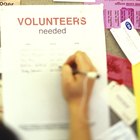Nearly every kind of special event that needs a formal opening -- from meetings to celebrations to fundraisers -- should start with a welcome remark. This speech will set the tone of the event, while making guests feel comfortable and giving them an idea of what's to come. A welcome remark doesn't have to be elaborate. In fact, the most effective opening speeches share the needed information in a short and concise manner.
Open the remarks by welcoming the guests to the event in a general manner. Introduce yourself to the crowd and state the name of the function you've gathered for. Thank everyone for attending the event, and personally thank by name any special guests or dignitaries who may be in the audience. Be open, relaxed and cheerful throughout the opening, as this will set the tone for the rest of your remarks, as well as the entire event to come.
Refer to the company, group or person being honored through the event, and give some history about its beginnings. For example, if the function is a graduation banquet for third-graders, describe what the children were like when they started the school year. If the function is honoring a charity, tell about how the organization was started, and talk briefly about its goals and missions.
Describe why everyone has gathered for the day. This should include the general focus of the event, such as honoring a local hero or celebrating the opening of a new library. Also briefly run through the line-up of events for the function, including any other speakers, workshops, forum discussions or dance times planned. Explain what you hope to achieve through the day, whether it's informing new employees about the company or simply having fun at a company picnic.
Briefly thank everyone who helped plan the event and again give a few words of welcome and thanks to all the attendees for participating. Introduce the next speaker, if there is one, or let the crowd know what is going to happen next. Tell the audience you hope they enjoy the event and say thank you before handing over the microphone or leaving the stage.
Related Articles

What Happens During a School Pep Rally?

How to Write a Letter of Intent to ...

Ideas for a Master of Ceremony Speech ...

Mother of the Bride Wedding Speech Ideas

Non-Denominational Wedding Prayers ...

Sponsor Thank You Gifts

Ideas for a 94th Birthday Celebration

Thank You Wording for a Gift of ...

How to Write a Family Reunion Welcome ...

Wording Ideas for Western Party ...

College Homecoming Theme Ideas

How to Stop AARP Mail

How to Build a Welcoming Packet for ...

How to Write an Invitation to Elected ...

Ideas for a Photo Slideshow Movie for a ...

What Are the Duties of the Father of ...

How to Write a Farewell Graduation ...

Wedding Prayers for a Bridal Brunch

How to Plan a Luncheon

How to Organize Community Service Events